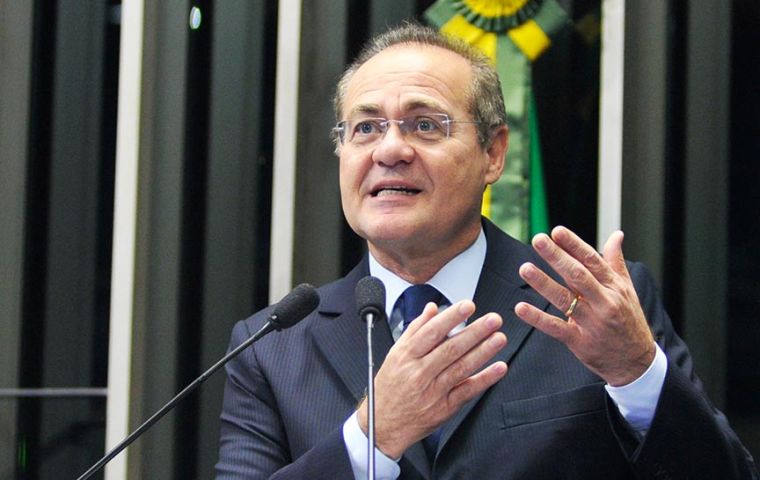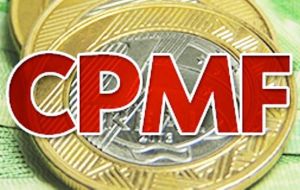MercoPress. South Atlantic News Agency
Brazil wants to revive financial transaction tax to increase revenue
 “We're in a deep economic crisis and any move in that direction would make the crisis worse,” said Senator Calheiros, speaker of the House.
“We're in a deep economic crisis and any move in that direction would make the crisis worse,” said Senator Calheiros, speaker of the House.  The last CPMF consisted of a 0.38% charge imposed on nearly every financial transaction in Brazil.
The last CPMF consisted of a 0.38% charge imposed on nearly every financial transaction in Brazil.  CPMF was eliminated in 2008 in a major defeat for then-President Lula da Silva, and subsequent attempts at reinstating it have failed
CPMF was eliminated in 2008 in a major defeat for then-President Lula da Silva, and subsequent attempts at reinstating it have failed The Brazilian government is considering reviving a financial transaction tax known as CPMF in a bid to shore up its finances in 2016, but the initiative apparently does not have sufficient support in Congress and President Dilma Rousseff's main coalition ally, PMDB, is not willing to make the presentation.
The plan to recreate the CPMF is part of the budget proposal for 2016 that is being discussed by Rousseff and her economic team, as was advanced by newspapers Valor Economico, O Estado de S.Paulo and O Globo.
The last CPMF consisted of a 0.38% charge imposed on nearly every financial transaction in Brazil. It was eliminated in 2008 in a major defeat for then-President Lula da Silva, and subsequent attempts at reinstating it have failed.
Congressional leaders said chances remain slim that the tax would be approved by lawmakers.
“I'm against it and I think it's unlikely that it would be approved here,” Lower House Speaker Eduardo Cunha told reporters in Brasilia.
Senate President Renan Calheiros said the Brazilian economy cannot withstand higher taxes at the moment. “We're in a deep economic crisis and any move in that direction would make the crisis worse,” he said.
Allegedly in a bid to reduce political resistance to the CPMF, the government now considers sharing part of its proceeds with states and municipalities.
But Rousseff's economic team is not in full agreement on the plan since “the finance ministry defends deeper expense cuts rather than tax increases”.
Faced with what is expected to be the worst recession in 25 years, the Brazilian government has been forced to lower its fiscal savings goals because of a sharp plunge in tax revenue.
Bringing back the CPMF would be part of a strategy that includes planned asset sales and spending cuts to achieve a primary surplus target of 0.7% of GDP in 2016, if and when the current government of Dilma Rousseff is still in office.




Top Comments
Disclaimer & comment rules-

-

Read all commentsThe CPMF is a tax that the rich pay. I accept !
Aug 30th, 2015 - 03:59 pm 0Really?
Aug 30th, 2015 - 10:00 pm 0We once has a similar inefficient tax here. It applied to every financial transaction. So a poor worker who live below the poverty line and wishes to transfer money to their mother for medicine wouldn't pay it?
Yeah the rich.
Blind support means you will be led blindly Brasileiro. This recession is your fault.
Commenting for this story is now closed.
If you have a Facebook account, become a fan and comment on our Facebook Page!